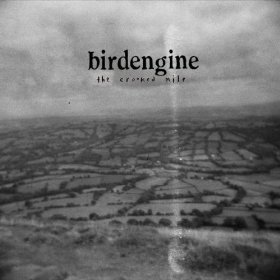Birdengine. The name conjures up one of Jan Svankmajer’s animated, nightmarish fairy tales; some fragile gothic contraption of bones and wires, of greasy feathers and rusty hinges. An unnatural, not to say unwholesome, hybrid of artifice and nature, designed for flight but jerkily erratic, both antiquated and impossibly fantastic at the same time. A tiny machine with a sickening, beating heart.
Birdengine is the musical guise of Dorset-born, Brighton-based Lawrie Joseph Tilbury, a thirty-one year old singer-songwriter whose hollowed-out head is a far darker and stranger object than even Svankmajer could create. This, after all, is a man who can silence a room with the lines "I spent the summer cutting heads off dogs / I spent the winter trying to sew them back on," sung entirely deadpan. And following a handful of EPs and a mini-album, I Fed Thee Rabbit Water, in 2007, The Crooked Mile marks Birdengine’s full-length debut on Bleeding Heart Recordings- formed out of the leftfield musical club night that has hosted many of Lawrie’s live sets over the past half-decade or so.
The Crooked Mile is unashamedly Outsider Music, riddled with themes of alienation and a sense of not belonging; an outcast even among the freaks. It’s a dark carnival moving on creaking wheels through the back roads and country lanes at midnight, along the Lovecraftian boundaries of dream and reality. And while Birdengine’s songs superficially resemble the parched gothic storytelling of The Handsome Family or Will Oldham, Tilbury is actually closer to a feral child of Comus and Tiny Tim, as much showbiz oddity as witch-starred changeling. Haunted, dry-ditch dirges mix with soaring melodies that recall Radiohead or Muse, though without any of the bombastic rock sensibilities that would suggest.
For instance, the quasi-mariachi guitar playing on opener ‘Phantom Limb’ conveys a certain gothic intensity and urgency, while swooping falsetto vocals hint at the operatic, but pomposity and pretension are always avoided thanks to the lo-fi, acoustic setting and the genuinely unnerving strangeness of it all. After the enigmatic ‘I, Dancing Bear,’ with only picked guitar and birdsong for accompaniment, there’s a sense of sudden, unexpected propulsion when bass and drums kick in, along with fluttering organ, on forthcoming single ‘No Arms, No Friends.’ We’re crashing through the trees, far from the forest path, tumbling towards who knows what, as spindly guitar notes drape cobwebs across your face, and the driving, two-note bassline communicates a raw, post-punk simplicity.
But its Tilbury’s striking voice that’s the album’s central feature. He sings as if with a mouth full of dry pebbles, like a clay figure unearthed from a drought-stricken river bed and breathed into uncanny half-life. Beneath the earthy primitivism and rustic reticence, there’s a sophisticated, diva-ish torch singer in the mould of Rufus Wainright or Antony Hegarty, struggling to be free. Indeed, with expressionistic lyrics pulled from the top drawer of Dr Caligari’s cabinet, these songs owe more to the Brecht-Weill darkness of pre-war cabaret and avant-garde theatre than they do to the populist naivety of genuine folk music; witness the violin and cello that slide and sway as though on castors through ‘Ghost Club,’ or the cultivated drama of ‘The Experiments of Dr Sarconi.’ If there are folk influences, they’re distinctly European; French, Basque, Flemish perhaps. But these dark, freakishly surreal songs are crafted, not sprung spontaneously from the common soil. "You’ve got no toes, only hooves; only hooves where toes should be," Tilbury sings on ‘Hoof,’ conjuring the films of Bunuel and David Lynch rather than contemporary freak-folk’s cinematic touchstone, The Wicker Man.
Nevertheless, Birdengine still sound like a Victorian curiosity preserved under glass, akin to the stuffed specimens of extinct and never-existed creatures in Brighton’s Booth Museum. When, on ‘Scarecrow and the Longpig,’ Tilbury refers to being apprehended by the authorities with his megaphone outside the shopping centre, the reference to mundane, modern-day life comes as an anachronistic shock, like glimpsing a pair of Nike trainers in Todd Browning’s Freaks. But ultimately, The Crooked Mile exists in its own universe, both of our world and distinctly other. "You taught me how to sleep and dream," Tilbury sings, on album closer ‘Make Happy.’ Ah, but what dreams, and what fevered visions have they begot!


